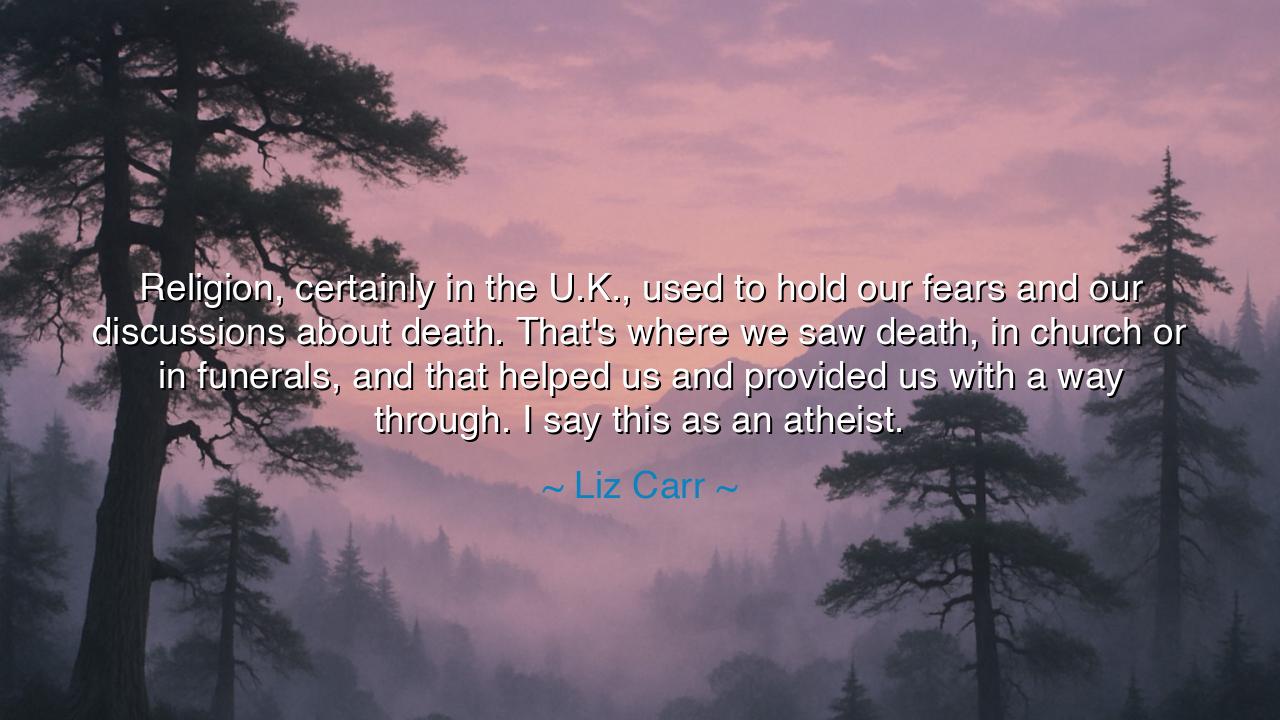
Religion, certainly in the U.K., used to hold our fears and our
Religion, certainly in the U.K., used to hold our fears and our discussions about death. That's where we saw death, in church or in funerals, and that helped us and provided us with a way through. I say this as an atheist.






In the ancient world, where the uncertainty of death loomed large over the hearts of men and women, one of the greatest comforts they sought was in their faith. Liz Carr, in her insightful reflection, reminds us that in the U.K., religion once held dominion over our most profound fears, particularly those surrounding death. She states, "Religion, certainly in the U.K., used to hold our fears and our discussions about death. That's where we saw death, in church or in funerals, and that helped us and provided us with a way through. I say this as an atheist." These words speak to a deeply rooted tradition where religion was not merely an abstract set of beliefs but a comforting framework for navigating life's most inevitable and terrifying truth—the end of our mortal existence.
For centuries, religion has served as the primary guide for the human soul in its confrontation with death. In the Christian tradition, death was seen not as the end, but as a passage to eternal life. Funerals and church rituals, from the reciting of prayers to the lighting of candles, were symbolic acts that helped individuals face the abyss of death with hope and grace. The church was a sanctuary where people could come together to mourn, to find solace, and to reflect on the mystery of life and death. In these sacred spaces, the fear of death was not something to be silenced or ignored but embraced through ritual and community, offering a path through sorrow and uncertainty.
In the ancient world, death was often viewed with an eerie reverence, and religion played a pivotal role in giving it meaning. Consider the Egyptians, whose elaborate burial rites and monumental pyramids reflected their deep concern with the afterlife. Their religion taught that death was a transition into an eternal journey, one where the soul would be judged by the gods and either rewarded or punished. Through rituals and offerings, the Egyptians sought to ensure a smooth passage to the next world. Similarly, the Greeks and Romans believed in the underworld, where the souls of the dead would reside. Religious practices surrounding death were not merely about honoring the deceased but about creating a bridge between the living and the dead, offering comfort to both.
However, Liz Carr, in acknowledging her atheism, points to a profound shift in modern society. As belief in the divine has waned for many, the rituals that once provided comfort in the face of death have lost their resonance. Religion, which once offered a structured way to confront mortality, no longer holds the same sway over the modern soul. In its absence, many are left to grapple with the fear of death without the comforting framework that religion once provided. Without the religious context that framed death as a rite of passage, death can seem like a terrifying, meaningless void—a stark reminder of our impermanence.
This change in how society views death and religion is not without consequence. Funeral practices and rituals that once brought people together in their grief now feel increasingly detached from the spiritual dimension of life. For those who no longer find solace in religious ceremonies, the act of mourning can become an isolated experience, one that offers little comfort or understanding in the face of loss. Yet, it is also an opportunity for rediscovery—to forge new ways of acknowledging and confronting death, ways that do not necessarily rely on religious doctrine but still provide a meaningful space for reflection and solace.
In the absence of religious rituals, we must ask: how do we, as a society, find a way to address the fear of death in a manner that is healing and purposeful? The lesson from Liz Carr’s words is not a condemnation of religion, but an invitation to adapt the practices that once served to comfort, and to create new frameworks for facing death. Ritual, in whatever form it may take, remains a vital part of our humanity. Whether we seek solace in personal reflection, in gathering with loved ones, or in the appreciation of life itself, we must acknowledge that death is not an enemy to be feared but a part of the natural cycle, one that we can face with dignity, compassion, and understanding.
Let us take this opportunity to build new rituals, ones that speak to our current understanding of life and death, and that offer the same comfort and connection that religion once provided. Whether through memorials, celebrations of life, or acts of kindness and legacy, we can find ways to honor the lives that have passed and to face our own mortality with courage and purpose. In doing so, we allow death to become not a source of fear, but a reminder to live fully, to appreciate the time we have, and to cherish every moment as a precious gift. Death, as the ancients knew, is part of life; it is in accepting it, rather than fearing it, that we find the true meaning of our existence.






AAdministratorAdministrator
Welcome, honored guests. Please leave a comment, we will respond soon